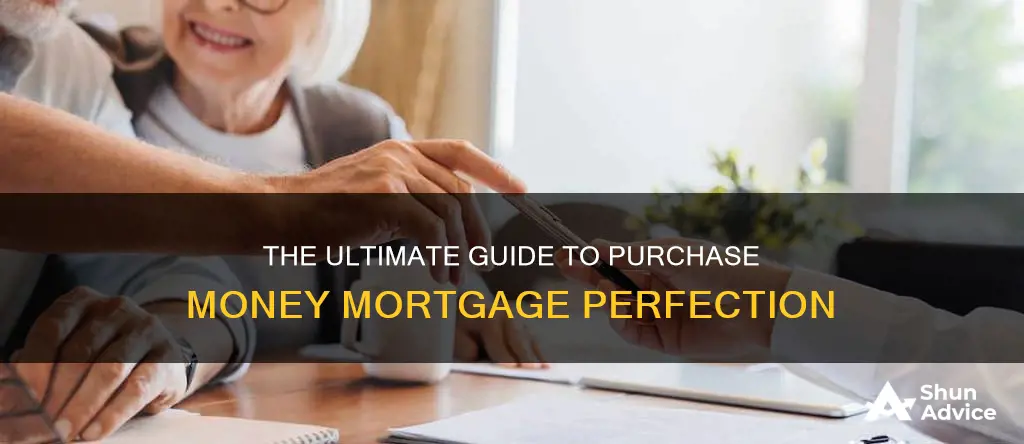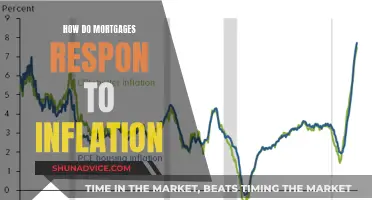
A purchase-money mortgage is a type of mortgage that is issued to the borrower by the seller of a home as part of the purchase transaction. It is a viable option for buyers who are unable to qualify for a traditional mortgage due to a poor credit score, high debt-to-income ratio, or inadequate funds for a down payment. In this arrangement, the seller acts as the lender, setting the terms for the down payment amount, interest rate, and closing fees. The buyer provides the seller with a down payment and signs a financing agreement that details the loan terms. This type of mortgage offers greater flexibility and lower costs, making homeownership more accessible. However, buyers may face higher interest rates and potential balloon payments at the end of the loan term.
| Characteristics | Values |
|---|---|
| Type of Mortgage | Non-traditional mortgage |
| Who is it for? | Buyers who cannot qualify for a traditional mortgage |
| Who issues it? | The seller of the home |
| What does the buyer give the seller? | A down payment and a financing instrument |
| Who decides the terms? | The seller |
| What are the terms? | Down payment amount, interest rate, and closing fees |
| What is the security instrument? | A public record protecting both parties from future disputes |
| What are the advantages? | Greater flexibility, lower costs, and more accessible homeownership |
| What are the disadvantages? | Higher interest rates and potential for a balloon payment at the end of the loan term |
| What is the process? | The buyer makes payments to the seller for a set time period. After the final payment or a refinance, the buyer receives the deed. |
What You'll Learn
- Purchase-money mortgages are an alternative to traditional lending
- Buyers can avoid conventional lenders and the typical underwriting process
- Buyers can choose from a range of payment options
- The security instrument is recorded in public records to protect both parties
- Purchase-money mortgages are a viable option for sellers to close homes faster

Purchase-money mortgages are an alternative to traditional lending
A purchase-money mortgage is a loan provided directly by the property seller to the buyer. It is an alternative to traditional lending and is usually considered when the buyer cannot qualify for a mortgage through traditional channels.
In this arrangement, the seller acts as the bank, setting the terms for the down payment amount, interest rate, and closing fees. The buyer makes a down payment to the seller and signs a financing agreement that details the loan terms. This agreement is recorded with the county to protect both parties' interests. The security instrument is typically recorded in public records, protecting both parties from future disputes.
A purchase-money mortgage can be used when the buyer is assuming the seller's mortgage, and the difference between the balance on the assumed mortgage and the property's sales price is made up of seller financing. This type of financing involves a mortgage agreement between the buyer and the seller, allowing the buyer to avoid traditional lenders and the typical underwriting process. The seller's criteria for the buyer's qualifications are typically more flexible than those of conventional lenders, making it a viable option for buyers with poor credit or inadequate funds for a down payment.
However, it is important to note that with a purchase-money mortgage, the buyer may face higher interest rates and the potential for a balloon payment at the end of the loan term. The seller usually retains the title until the financed amount is paid off, and if the buyer stops making payments, the seller can foreclose and reclaim the property.
Concealing Cash: Strategies for Hiding Money When Applying for Mortgages
You may want to see also

Buyers can avoid conventional lenders and the typical underwriting process
A purchase-money mortgage, also known as seller financing, is a loan given directly by the property seller to the home buyer. This is often used when the buyer cannot qualify for standard bank financing. In this arrangement, the seller acts as the bank, setting the terms for the down payment amount, rate of interest, and closing fees. The buyer makes a down payment to the seller and signs a financing agreement that details the loan terms. This agreement is recorded with the county to protect both parties' interests.
The mortgage underwriting process can be complicated and time-consuming. It involves determining a borrower's eligibility for a loan by assessing their income, assets, debts, and credit history. The underwriter will also order a home appraisal to ensure that the loan amount matches the home's value. This process can take anywhere from a few days to a few weeks, and the quicker the borrower compiles the necessary documents, the smoother and speedier the process will be.
By opting for a purchase-money mortgage, buyers can avoid the traditional underwriting process. This is especially useful for buyers who may not meet stringent bank requirements, such as those with a high debt-to-income ratio, low credit score, or inadequate funds for a down payment. The criteria for the buyer's qualifications are typically more flexible than those of conventional lenders, allowing individuals with less-than-perfect credit to achieve homeownership.
However, it is important to note that with a purchase-money mortgage, buyers may face higher interest rates and the potential for a balloon payment at the end of the loan term. Additionally, buyers and sellers should be aware of the risks involved in this type of arrangement and consider discussing options with a financial advisor before committing.
Single Homeowners: Strategies for Affording a Mortgage
You may want to see also

Buyers can choose from a range of payment options
A purchase-money mortgage is a loan issued by the seller to the buyer as part of the purchase transaction. It is usually carried out when the buyer cannot qualify for a mortgage through traditional lending channels. In this arrangement, the seller acts as the bank, setting the terms for the down payment amount, rate of interest, and closing fees. The buyer makes a down payment to the seller and signs a financing agreement that details the loan terms.
- Interest-only payments: Buyers pay only the interest on the loan during the initial period of the mortgage. This results in lower monthly payments at the beginning of the loan but does not reduce the principal balance.
- Fixed-rate amortization: Buyers pay a fixed interest rate on the loan, which is amortized over the loan term. This results in a consistent monthly payment throughout the life of the loan.
- Less-than-interest payments: Buyers pay an interest rate that is below the market rate or a fixed rate that is lower than the prevailing interest rates.
- Balloon payments: Buyers make smaller payments at the beginning of the loan term and a larger payment at the end of the loan term to pay off the remaining balance. This option may provide more flexibility in the initial years but requires a large sum of money to be paid at the end.
The flexibility of a purchase-money mortgage allows buyers to select a payment plan that best suits their financial situation. Payments can be customized to meet the buyer's needs, and interest rates can be adjusted periodically or remain constant based on the agreement between the buyer and seller. Down payments are also negotiable, and buyers may be able to make periodic lump-sum payments toward the down payment if they are unable to provide the full amount upfront.
Assuming a Mortgage: Dealing with a Deceased's Debt
You may want to see also

The security instrument is recorded in public records to protect both parties
A purchase-money mortgage is a type of mortgage issued to the borrower by the seller of a home as part of the purchase transaction. It is also known as a seller or owner financing option. This type of mortgage is usually sought when the buyer cannot qualify for a mortgage through traditional lending channels.
In this arrangement, the seller acts as the bank, determining the terms for the down payment amount, rate of interest, and closing fees. The buyer makes a down payment to the seller and signs a financing agreement that details the loan terms. This agreement is recorded in public records, protecting both parties from future disputes. The security instrument is recorded in public records to protect both parties. This is a crucial step in the process, as it ensures that the buyer and seller can refer to the agreed-upon terms should any disputes arise in the future. It also helps to validate the agreement and make it legally binding.
The security instrument, or financing agreement, typically includes the specific details of the loan, such as the loan amount, interest rate, payment schedule, and any other relevant terms and conditions. By recording this document in public records, both parties can have peace of mind knowing that their agreement is official and recognised by the appropriate authorities.
It's important to note that the process of recording the security instrument may vary depending on the location and applicable laws. In some cases, the document may need to be notarised or witnessed to be considered valid. Additionally, there may be specific requirements for the format or content of the security instrument to be accepted for public record.
Overall, the recording of the security instrument in public records is a critical step in the purchase-money mortgage process, as it helps protect the interests of both the buyer and the seller by providing a clear and official record of their agreement.
Navy Federal Mortgages: Competitive Rates, What Else?
You may want to see also

Purchase-money mortgages are a viable option for sellers to close homes faster
A purchase-money mortgage is a loan given directly by the property seller to the buyer. It is an alternative to traditional lending and can be used when the buyer cannot qualify for a mortgage through conventional channels. This may be due to a high debt-to-income (DTI) ratio, a low credit score, or inadequate funds for a down payment.
The purchase-money mortgage process is faster than a traditional mortgage because there is no bank involved. The seller acts as the bank, setting the terms for the down payment amount, interest rate, and closing fees. The buyer makes a down payment to the seller and signs a financing agreement that details the loan terms. This agreement is recorded with the county to protect both parties' interests. The seller may also receive the full list price or higher for the home when providing a purchase-money mortgage.
Since the process doesn't go through a traditional mortgage lender, the buyer and seller can decide whether or not to get an appraisal. Most experts recommend getting an appraisal to learn the home's value. Although there are risks involved for both parties, a purchase-money mortgage is a viable option for sellers to close their homes faster. Buyers struggling to qualify for a traditional mortgage can benefit from this type of financing, and sellers can close their homes faster.
However, it is important to note that buyers may face higher interest rates and the potential for a balloon payment at the end of the loan term. The seller takes on a large risk by providing the financing, and if the buyer gets in over their heads with a mortgage loan they can't afford, the seller has the right to foreclose on the property. Therefore, it is recommended that buyers and sellers discuss options with a financial advisor before committing to a purchase-money mortgage.
Adding a Co-Borrower: Mortgage Options Without Refinancing
You may want to see also
Frequently asked questions
A purchase-money mortgage is a mortgage issued to the borrower by the seller of a home as part of the purchase transaction. It is usually done when the buyer cannot qualify for a mortgage through traditional lending channels.
A purchase-money mortgage can be a good option for buyers who don't qualify for traditional financing due to a poor credit score, high debt-to-income ratio, or inadequate funds for a down payment. It provides greater flexibility, lower costs, and a wider range of payment options, making homeownership more accessible.
While a purchase-money mortgage can provide flexibility in payment options and qualification criteria, there are also some potential downsides. The interest rates may be higher, and there is a potential for a balloon payment at the end of the loan term. Additionally, buyers may face higher closing costs and less protection compared to traditional mortgages.







